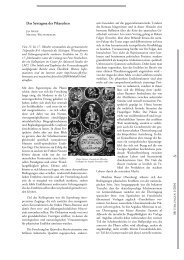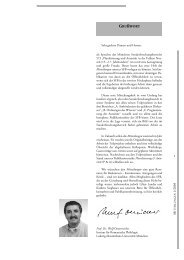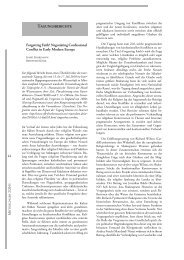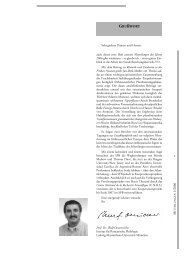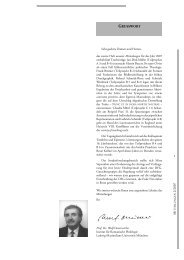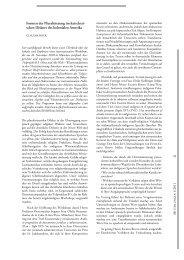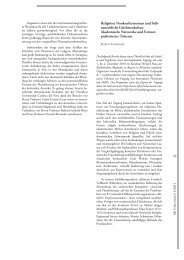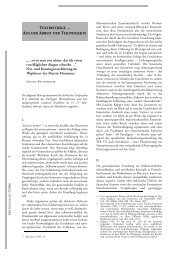Mitteilungen 2-2011_final.fm - SFB 573 - Ludwig-Maximilians ...
Mitteilungen 2-2011_final.fm - SFB 573 - Ludwig-Maximilians ...
Mitteilungen 2-2011_final.fm - SFB 573 - Ludwig-Maximilians ...
Erfolgreiche ePaper selbst erstellen
Machen Sie aus Ihren PDF Publikationen ein blätterbares Flipbook mit unserer einzigartigen Google optimierten e-Paper Software.
24<br />
MITTEILUNGEN 2/<strong>2011</strong><br />
There are two further references to the magical<br />
power of written words and how they cast their spell in<br />
law. Writing is, unsurprisingly, associated with witchcraft<br />
by the illiterate rebels. When they arrest the clerk<br />
from Chartham and discover that he carries »a book in<br />
his pocket with red letters in’t«, Cade concludes without<br />
hesitation: »Nay, then, he is a conjuror« (4.2.83 f.). This<br />
is coupled with the accusation that the clerk is an agent<br />
of the law: »Nay, he can make obligations and write<br />
courthand« (85 f.). The parallel syntax of these charges<br />
implies a logical parallel between conjuring and the<br />
ability to draw up legally binding documents. Superstitious<br />
belief in the magical power of writing is not<br />
restricted to women or the lower classes, but is also<br />
evoked by male members of the nobility. When Suffolk<br />
is caught by pirates on his way into exile, the Duke<br />
angrily challenges one of them whom he recognizes as a<br />
former bondsman of his: »This hand of mine hath writ<br />
in thy behalf / And therefore shall it charm thy riotous<br />
tongue.« (4.1.63 f.) The struggle between outlawed<br />
nobleman and lawless pirate is couched in terms of a<br />
contest between literacy and orality, remembering and<br />
forgetfulness. Suffolk tries to reinstate the feudal relationship<br />
in which his power over writing legitimizes his<br />
power over the socially inferior, illiterate bondsman. Yet<br />
the scene takes place in a legal vacuum, on board of a<br />
pirate ship and between two persons who exist outside<br />
the law. In this context, the power of writing is suspended<br />
and all that remains is the brute force of violent<br />
words. A Lieutenant responds to Suffolk’s arrogant<br />
challenge, »let my words stab him, as he has me«, whereupon<br />
Suffolk scoffs: »Base slave, thy words are blunt,<br />
and so art thou.« (66 f.) The spoken word, however,<br />
wins over written ones in this scene. This, as well as the<br />
fact that the Lieutenant acts as eloquent spokesperson<br />
for the commoners’ grievances (75–103), points forward<br />
to the immediately following scenes of Cade’s<br />
rebellion with its radical rejection of both literacy and<br />
the law which serves the upper classes.<br />
What does this mean for our topic of how historical<br />
memory is mediated and shaped, and in particular for<br />
the role which the early modern theatre played in this<br />
process? I would like to suggest that this play about<br />
English medieval history speaks not only of the events<br />
of that past but also, and perhaps even primarily, of<br />
issues and concerns of the present. Such a topical<br />
reading was indeed the dominant mode of perceiving<br />
history in the Middle Ages and the Early Modern period:<br />
history functioned as a mirror or example for the<br />
present. As Jonathan Frow comments in a different context,<br />
each reconstruction of the past (such as Shakespeare’s<br />
play) is inevitably shaped by conditions and<br />
constraints determined by the present. 1 What then were<br />
the »conditions and constraints« of the Elizabethan audience’s<br />
present? To whom or for whom is Cade speaking<br />
when he gives order »to burn all the records of the<br />
1. Frow 1997, 229.<br />
realm« (4.7.12 f.), or when he upbraids Lord Saye:<br />
»Thou hast most traitorously corrupted the youth of the<br />
realm in erecting a grammar school [and] thou hast<br />
caused printing to be used and […] built a paper mill«<br />
(23–34)? Print, paper-mills and grammar schools would<br />
have been anachronistic phenomena in 1450, the time<br />
of the historical Jack Cade, and even more so in the time<br />
of the 1381 Peasant Rising which provides the main<br />
source for the rebels’ anti-literacy. 2 What Shakespeare’s<br />
Cade articulates here, then, are late Elizabethan concerns<br />
about the pervasive economic, legal and educational<br />
impact written culture had on everyday life, and by<br />
which the illiterate classes saw themselves increasingly<br />
disadvantaged. 3 In the light of the Tudor »reading revolution«<br />
(Kevin Sharpe), during which more than 400<br />
grammar schools sprang up, Cade’s anti-literacy, rather<br />
than speaking for the common people who probably esteemed<br />
and desired the acquisition of literacy as enabling<br />
their own social aspirations, may well have articulated<br />
aristocratic anxieties about upward social mobility.<br />
4<br />
Yet the topical reading does not only extend to the<br />
issues the play ostensibly speaks about, such as rebellion<br />
and the abuse of power by a selfish aristocracy. I think<br />
we can also profitably employ the perception habit of<br />
topicality to describe the acts of remembering and forgetting<br />
which the play itself performs. The context of<br />
the Reformation as one of the most pressing concerns of<br />
the Elizabethan present is important here: the repeated<br />
confessional change – from Catholicism to Protestantism<br />
under Henry VIII and Edward VI, back to the<br />
Catholic faith under Mary and again to a more moderate<br />
Anglican position under Elizabeth – was accompanied<br />
by a concerted, often violent, destruction of<br />
religious symbols and monastic houses, the abolishment<br />
of Catholic doctrines and rites, and the erasure of<br />
Saints’ days from the official calendar (to say nothing of<br />
the hundreds of believers who were executed as heretics<br />
because they did not adhere to the official confession of<br />
the day). The erasure and adjustment of popular memory<br />
through the Reformation adds another level of topical<br />
reference: a concern about memory and the forces<br />
that shape it.<br />
In this context, The Contention is not only a play<br />
about medieval and Elizabethan political culture. It is<br />
also a play about the very process of making history, a<br />
process informed by acts of remembering as well as of<br />
forgetting. In this sense, the mnemonic projects in the<br />
play correspond to the mnemonic project of the play,<br />
for the ruptures in the social order which are staged in<br />
the scenes of popular rebellion can be seen as a staging<br />
of the ruptures in cultural memory brought about by<br />
the readjustments of the Reformation. In exhibiting the<br />
mnemonic anxieties that surround the political and<br />
2. Linton 1996, 16.<br />
3. Smith 2008, 69.<br />
4. Fitter 2004, 198 f.



